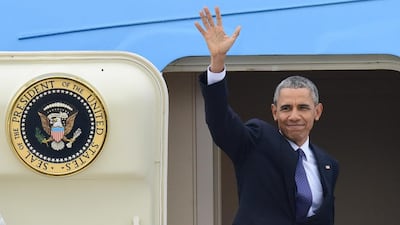Imagine you are an incoming American president, and you find in the Oval Office a bust of a man who wanted to hold on to the British empire at all costs, who regarded Myanmar’s independence hero, Aung San, as a “quisling” and a “traitor”, and who described the sight of Mahatma Gandhi – “a seditious Middle Temple lawyer, now posing as a fakir” – as “alarming and nauseating”.
This man had been responsible for one of the greatest disasters of the First World War – the Gallipoli campaign – and also caused a terrible economic downturn in the 1920s, when as Britain’s chancellor he insisted on sterling returning to the gold standard.
It might be perfectly understandable, one would think, for a liberal US leader to decide he would rather not have a statuette of such an old reactionary on his side table.
None of this was taken into account, however, when the well-worn accusation that Barack Obama had a bust of Winston Churchill removed from his office was rehashed after Mr Obama made his dramatic intervention into Britain’s “Brexit” debate.
“Some said it was a snub to Britain. Some said it was a symbol of the part-Kenyan president’s ancestral dislike of the British empire – of which Churchill had been such a fervent defender,” wrote Boris Johnson, London’s mayor, in The Sun newspaper.
The US president’s father was indeed Kenyan. And Mr Johnson does not deserve condemnation for pointing that out. For while Barack Obama Sr was a marginal presence in his son’s life, would it be that unusual if, knowing the horrors inflicted under colonial rule, Obama Jr did not grow up harbouring some misgivings about the country that had conquered the land of his ancestors?
More pertinently, if Mr Obama had even an inkling of Mr Churchill’s views on race – he was “strongly in favour of using poisonous gas against uncivilised tribes” – it would be no wonder that the first African-American president might think it “appropriate to have a bust of Martin Luther King in my office” instead.
In fact, Mr Obama has another bust of Mr Churchill in his residence. Mr Johnson and others, he implied, were reading too much into it.
But all such nuances were overlooked in the instantly-confected outrage about the incident. Churchill is seen solely through the lens of his finest hours, when he was the lonely voice against appeasement in the 1930s and then led his country staunchly in the fight against Hitler.
The second Churchill certainly deserves our admiration. But the first does not. And had he not made it to 10 Downing Street, that is the one who would have been remembered – a criminally reckless adventurer whose charm allowed him to cause a great deal of trouble and far worse for everyone else.
The whole affair reduces history and its “great men and women” to black and white. The tendency to identify leaders as “good” or “bad” seems childish. Surely such superficial judgments cannot stand in an age where so much knowledge and scholarship is now only a mouse click away?
Yet stand they do, and even the highest are not above yielding to their temptations. But these judgments are not without consequence. George W Bush’s branding of North Korea, Iran and Iraq as the “axis of evil” in 2002 may have satisfied those who wanted to hear strong words against rogue states, but it closed the door on any in those states who wished to reach for more amicable solutions.
Mr Churchill’s view that Aung San was a “traitor” for having allied with the Japanese until nearly the end of the Second World War would not be popular in Myanmar today, where his daughter Aung San Suu Kyi is now the de facto chief executive.
But that just shows the folly of such black and white reductionism. History, as taught by the western victors of the war, paints any such cooperation as traitorous. But this is curiously myopic, and ignores what was perfectly obvious to earlier generations of imperialists.
In 1848, for instance, a General Sir John Low was writing to the East India Company that if they were to take over the Indian state of Hyderabad, the natives would “feel no sort of gratitude to us … they will remember only the vexations they will be subject to under our rule; for the natives of this country are, after all, not different from the inhabitants of all parts of the known world, in that they like their own ways better than those of foreigners”.
Why shouldn’t some of the peoples of Asia have initially welcomed those who said they were liberators over their colonisers – however it later turned out?
This perspective is, however, still nearly absent from the never-ending torrent of publications on the period.
Yes, history may be written by the victors, but that doesn’t mean it ought not to be rewritten by those who were swept up by the storms of wars their masters unleashed.
If Mr Obama was being polite, and actually he really didn’t want a bust of Churchill in the Oval Office on perfectly justifiable ancestral grounds, it would have been undiplomatic for him to say so. But it would have been refreshing – and might have illuminated subtleties of the past that too many still wish to ignore.
Sholto Byrnes is a senior fellow at the Institute of Strategic and International Studies, Malaysia


